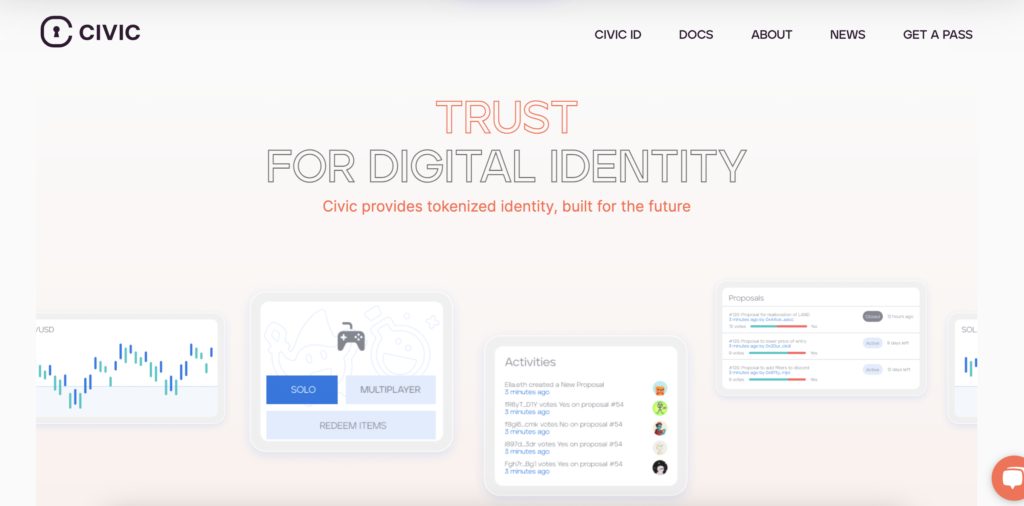In this article, we will delve into the intricacies of the Civic project and its associated cryptocurrency, CVC. We will explore the various aspects that define Civic, including its history, technological framework, tokenomics, ecosystem, growth prospects, and future development predictions. By the end of this comprehensive examination, readers will have a detailed understanding of Civic’s unique value proposition in the blockchain space and how it aims to revolutionize identity verification.

What is Civic?
Civic is a blockchain-based identity verification platform designed to provide individuals and businesses with a secure, decentralized method for managing and verifying personal information. Utilizing advanced blockchain technology, Civic aims to eliminate the inefficiencies and vulnerabilities associated with traditional identity verification processes. The platform enables users to store and share their personal data through the Civic app, granting access to trusted parties only when necessary and with explicit consent. Civic’s primary goal is to enhance privacy and security while reducing the risks of identity theft and fraud in a seamless, user-friendly manner.
Project History
Civic was founded in 2015 with the mission to revolutionize identity verification through blockchain technology. The project’s journey began with the development of its foundational infrastructure and the launch of the Civic app. In 2017, Civic successfully conducted an Initial Coin Offering (ICO), raising significant funds to further its development and expand its services.
Over the years, Civic has achieved several milestones, including the integration of its identity verification services with various business platforms and the continual enhancement of its app’s functionality and security features. The project has also formed strategic partnerships with key players in the blockchain and cybersecurity industries, further solidifying its position in the market.
Civic’s evolution reflects its commitment to addressing the growing need for secure digital identity solutions, consistently innovating to stay ahead of emerging threats and regulatory changes.
How Civic Works
Civic operates on a robust technological framework that leverages blockchain technology to provide decentralized identity verification services. The platform is built to ensure that users have complete control over their personal data, which is stored securely on their devices and only shared with trusted parties upon explicit consent. Civic’s innovative approach addresses the limitations and vulnerabilities of traditional identity verification methods by using advanced cryptographic techniques and decentralized networks.
Civic utilizes a combination of blockchain technology and smart contracts to ensure the integrity and security of identity data. The platform’s core components include the Civic Secure Identity Platform (SIP) and the Civic app. The SIP serves as the backbone, enabling secure interactions between users and service providers. The Civic app acts as the user interface, allowing individuals to manage their identities, authenticate transactions, and grant access to their data when needed.
Civic’s Blockchain and Consensus Mechanism
Civic’s identity verification process is underpinned by a blockchain network that provides a tamper-proof ledger for recording identity attestations. The platform primarily utilizes the Ethereum blockchain due to its robust security, widespread adoption, and support for smart contracts. Civic’s smart contracts facilitate the automated and secure verification of identity information without the need for intermediaries.
The consensus mechanism employed by Civic is the Proof of Stake (PoS) model. In this system, validators are selected to create new blocks and confirm transactions based on the amount of cryptocurrency they hold and are willing to “stake” as collateral. This approach is more energy-efficient and scalable compared to the traditional Proof of Work (PoW) mechanism, aligning with Civic’s goal of providing a sustainable and efficient identity verification solution.
Technical Details
Civic’s use of blockchain technology ensures that each identity verification request and response is immutably recorded, providing an auditable trail that enhances trust and accountability. The platform employs advanced encryption methods to protect user data, ensuring that it remains confidential and secure from unauthorized access. Furthermore, Civic’s decentralized architecture eliminates single points of failure, reducing the risk of data breaches and enhancing overall system resilience.
By combining blockchain’s inherent security features with cutting-edge cryptographic techniques, Civic differentiates itself from other identity verification solutions. Its user-centric approach, which emphasizes data privacy and user control, sets it apart in the increasingly critical field of digital identity management.
Civic Tokenomics
Civic’s native cryptocurrency, the Civic Token (CVC), is an ERC-20 token that operates on the Ethereum blockchain. As a token, CVC is designed to facilitate transactions within the Civic ecosystem, enabling users to pay for identity verification services and incentivize network participants.
Token Supply and Distribution
The total supply of CVC was fixed at 1 billion tokens during its Initial Coin Offering (ICO) in 2017. The ICO allocated tokens for various purposes: a portion was sold to investors, while the remainder was reserved for the development team, strategic partnerships, and future ecosystem growth. The fixed supply model helps mitigate inflationary pressures, ensuring the token’s scarcity over time.
Utility and Functionality
CVC serves multiple functions within the Civic platform. Users pay with CVC to access identity verification services, while validators earn CVC for providing these services and ensuring data integrity. This creates a self-sustaining ecosystem where CVC acts as both a medium of exchange and a reward mechanism.
Emission Model
CVC’s emission model is based on a deflationary approach, where the total supply is predetermined, and no new tokens are created. This fixed supply ensures that the value of CVC is influenced by market demand and utility within the Civic ecosystem. The scarcity of tokens can lead to appreciation in value as the platform’s adoption grows.
Market Performance
Since its launch, CVC has been traded on various cryptocurrency exchanges, where its price is determined by market forces. The token has experienced fluctuations in value, reflecting broader market trends and developments within the Civic platform. Market participants can trade CVC against other cryptocurrencies or fiat currencies, providing liquidity and facilitating its use within the Civic ecosystem.
Incentive Structure
Civic’s tokenomics are designed to create a balanced and sustainable economic model. By rewarding validators with CVC, the platform ensures that high-quality identity verification services are consistently provided. Users are incentivized to participate in the ecosystem through the benefits of secure and efficient identity verification, further driving demand for the token.
In summary, the Civic Token (CVC) plays a crucial role in the Civic ecosystem, enabling secure, decentralized identity verification services. Its fixed supply, utility-driven demand, and incentivization mechanisms are key components of its tokenomics, distinguishing it from other digital assets in the blockchain space.
Where to Buy Civic Token (CVC)
CVC, the native token of the Civic platform, is widely available on several major cryptocurrency exchanges. Here is a list of prominent exchanges where you can purchase CVC:
- Binance: One of the largest and most popular cryptocurrency exchanges globally, Binance offers a wide range of trading pairs for CVC, including CVC/BTC, CVC/ETH, and CVC/USDT.
- HTX (formerly Huobi): HTX provides a robust trading platform with multiple CVC pairs, ensuring liquidity and ease of access for traders.
- Gate.io: Known for its user-friendly interface and extensive range of cryptocurrencies, Gate.io lists CVC and supports various trading pairs.
- BingX: BingX offers CVC trading options, catering to both novice and experienced traders with its advanced trading features.
When purchasing CVC, ensure that you use a reputable exchange and follow necessary security measures to protect your funds.
Where to Store Civic Token (CVC)
Storing your CVC securely is crucial to protect your investment. Here are some recommended wallets that support CVC, along with their features:
- Ledger Nano S/X: Hardware wallets like the Ledger Nano S and Nano X provide one of the highest levels of security for storing CVC. These devices keep your private keys offline, significantly reducing the risk of hacks.
- Trezor: Another popular hardware wallet, Trezor, offers robust security features and supports CVC. It is user-friendly and compatible with various software wallets for managing your tokens.
- MetaMask: A widely used browser extension wallet, MetaMask allows you to store, send, and receive CVC. It integrates seamlessly with many decentralized applications (dApps) and provides a convenient way to manage your tokens.
- Trust Wallet: This mobile wallet supports CVC and offers a simple, intuitive interface. Trust Wallet provides a secure environment for managing your cryptocurrencies and accessing dApps on the go.
- MyEtherWallet (MEW): A popular web-based wallet, MEW supports CVC as an ERC-20 token. It allows users to interact with the Ethereum blockchain directly and provides various security features to safeguard your assets.
When choosing a wallet, consider factors such as security, ease of use, and compatibility with your needs. Using hardware wallets for long-term storage and software wallets for daily transactions can offer a balanced approach to managing your CVC holdings.
Project Growth Prospects
Civic’s growth prospects are founded on its innovative approach to identity verification, leveraging blockchain technology to offer secure, decentralized solutions. The increasing demand for reliable and privacy-focused identity verification services in various sectors, including finance, healthcare, and e-commerce, positions Civic for substantial growth. The platform’s ability to address key challenges such as data breaches and identity theft enhances its appeal to businesses and individual users alike.
Clients and Partners
Civic has established a diverse clientele and formed strategic partnerships to expand its ecosystem and enhance its service offerings. Key clients include financial institutions, online service providers, and healthcare organizations that require secure and efficient identity verification solutions. Notable partners in Civic’s network include:
- Token: Partnered to enhance secure identity solutions within financial services.
- IDB Bank: Collaborated to provide streamlined identity verification for banking customers.
- Coinbase: Integrated Civic’s identity verification to streamline user onboarding processes.
These partnerships and client relationships underscore Civic’s credibility and its commitment to delivering robust identity verification solutions.
Future Development Forecast
The forecast for Civic’s development is promising, with several factors driving its potential for growth:
- Regulatory Compliance: As regulations around data protection and identity verification become stricter, Civic’s solutions are well-positioned to help businesses comply with these requirements.
- Technological Advancements: Ongoing enhancements in blockchain technology and cryptographic methods will further strengthen Civic’s platform, making it more secure and scalable.
- Market Adoption: The growing acceptance and integration of blockchain solutions in various industries will likely increase the adoption of Civic’s services.
- Innovation in Services: Civic’s continuous innovation, such as the introduction of new verification methods and user-friendly features, will attract more users to the platform.
Civic Ecosystem
Civic’s ecosystem encompasses various components and integrations that work together to provide a comprehensive identity verification solution. The ecosystem is designed to ensure seamless interactions between users, validators, and service providers. Key components include:
- Civic App: The primary interface for users to manage their identities and interact with the Civic platform.
- Civic Secure Identity Platform (SIP): The core infrastructure enabling secure data exchanges and identity attestations.
- Validators: Entities that verify user identities and attest to their authenticity, earning CVC tokens as rewards.
- Service Providers: Businesses and organizations that integrate Civic’s verification services to authenticate users efficiently.
Key Ecosystem Participants
- Validators: These are crucial to maintaining the integrity of the Civic network. They perform the actual verification of identities and play a pivotal role in ensuring data authenticity.
- Service Providers: Entities like financial institutions, healthcare providers, and online platforms that require secure and efficient identity verification services.
- Technology Partners: Companies that provide technological support and integrations to enhance Civic’s platform capabilities.
By fostering a robust ecosystem and forming strategic alliances, Civic aims to create a secure and user-friendly environment for identity verification, positioning itself as a leader in the decentralized identity space.
Conclusion
Civic and its cryptocurrency, CVC, present a compelling case within the blockchain ecosystem. As the demand for secure, efficient, and user-friendly identity verification solutions continues to grow, Civic’s innovative approach positions it well for significant impact and adoption. This article has provided an in-depth look at the many facets of Civic, offering insights into its potential to shape the future of digital identity verification.






